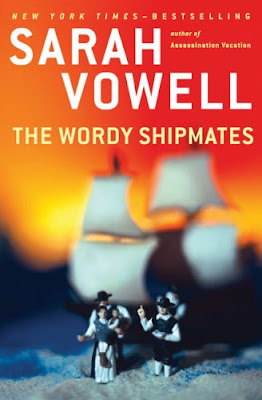for the love of glory
 For Christmas, I was given a wonderful little book, "The Wordy Shipmates," by Sarah Vowell that examines the New England Puritans and how their legacy impacts the US. Vowell writes in chatty tones telling the story of the Puritans, most notably John Winthrop, originator of the "America-as-City-on-a-hill" soundbite that fills political speeches today. Our own Baptist heritage is also on display as Roger Williams is prominent. Anne Hutchinson is even discussed! The book in large part, traces the roots of America's exceptionalism ,the belief we are uniquely singled out by God, in a compassionate, witty way.
For Christmas, I was given a wonderful little book, "The Wordy Shipmates," by Sarah Vowell that examines the New England Puritans and how their legacy impacts the US. Vowell writes in chatty tones telling the story of the Puritans, most notably John Winthrop, originator of the "America-as-City-on-a-hill" soundbite that fills political speeches today. Our own Baptist heritage is also on display as Roger Williams is prominent. Anne Hutchinson is even discussed! The book in large part, traces the roots of America's exceptionalism ,the belief we are uniquely singled out by God, in a compassionate, witty way.What I appreciate most about the book is Vowell's sympathy for her subject. An avowed atheist, she admirably sympathizes with the Puritans she discusses and this makes her discussion of their beliefs all the more compelling. Her efforts to humanize them makes the Puritan real people we can begin to understand. If she is not a theologian, she has certainly grasped something of the "feel" of faith, I think. She writes:
"The thing that appeals to me about Winthrop's "Christian Charity and Cotton's "God's Promise to His Plantation" from this end of history is that at least the arrogant ballyhoo that New England is a special and chosen by God is tempered by the self-loathing Puritan's sense of reckoning. The same wakefulness the individual Calvinist was to use to keep watch over his own sins Winthrop and Cotton caled for also in the group at large, This humility, this fear, was what kept their delusions of grandeur in check. That's what subsequent generation lost. From New England's Puritans we inherited the idea that America is blessed and ordained by God above all nations, but lost the fear of wrath and retribution." The Wordy Shipmates, p.71-72
Later she confesses that while an atheist (agnostic?) she wants to believe we are chosen, as Winthrop states because it feels so natural and right and important. I find it a fascinating observation because I feel the same contradiction, for the same reasons it existed in the Puritans. As an heir to reform theology, specifically Jonathan Edwards and Piper, glory has become a problem for me. I mean, what is it? What do we mean by it, and why does it dictate God's behavior, at least in our rhetoric?
 Somehow, the sharp contradiction Vowell finds in the Puritans, human as it is, has roots in the way we see people as an end to God's glory instead of relationship as God's end for us. I feel that sometimes, when God's glory, whatever it is, becomes the goal and people get used to justify whatever "glorifies" God. But let's be honest: we are always the ones determining what glorifies Him in a given situation. We make decsisions about what glorifies him, in ways that sometimes don't care for others, something that should seem unthinkable given the cross.
Somehow, the sharp contradiction Vowell finds in the Puritans, human as it is, has roots in the way we see people as an end to God's glory instead of relationship as God's end for us. I feel that sometimes, when God's glory, whatever it is, becomes the goal and people get used to justify whatever "glorifies" God. But let's be honest: we are always the ones determining what glorifies Him in a given situation. We make decsisions about what glorifies him, in ways that sometimes don't care for others, something that should seem unthinkable given the cross.In a serendipitous turn, Ben posted something in a similar vein at Faith and Theology. Actually it's not serendipitous at all since I read it every day... In the comments there is a link to a post at Ben Witherington's website, For God So loved Himself that examines the Edwardsean/Piper Glory theology in a biblical way that is immensley helpful for talking about it with people. You must check out Witherintons post first, along with the comments. It's great fun. Increasingly I find this to be at root of a lot of ways we see problems. I wonder if it describes how we as a church are trying to be different?


Comments
Post a Comment
I cherish your comments, but not vileness or wickedness. By vileness I mean Spam, and wickedness I mean hateful speech. Unless it's about spam.